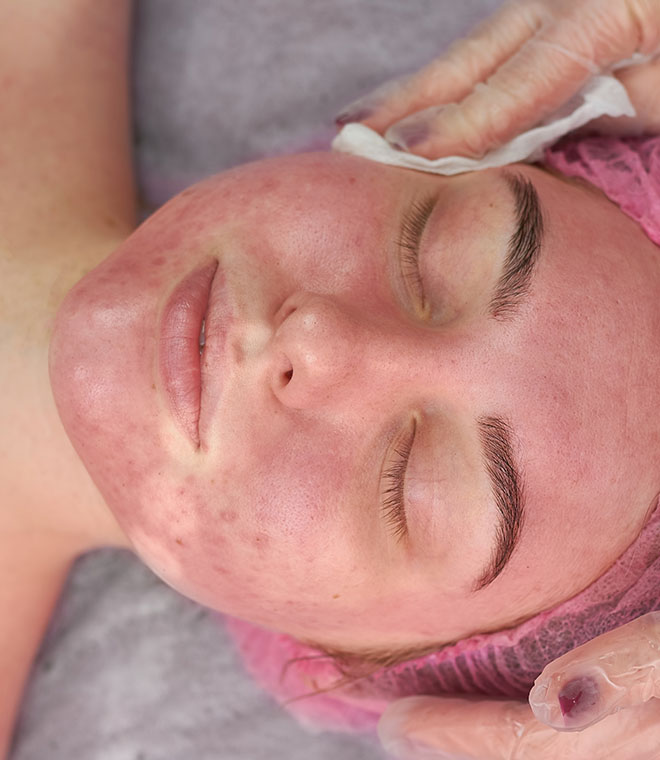Health
Skin conditions that can worsen from stress
By Bethanne Black Nov 05, 2020 • 8 min
Stress is more than just a nuisance — it can affect your entire body, including your skin, hair and digestive system.
Although stress is a fact of life, you can learn to reduce your stress and find ways to manage it. Here, we'll help you understand how stress can possibly worsen skin conditions and how to reduce your skin flare-ups.
How does stress affect the skin?
Stress causes a chemical reaction in your body that can negatively affect your skin. When you are experiencing ongoing stress, levels of cortisol, a stress hormone, remain elevated. This can suppress the immune system and cause an inflammatory response in the skin, which may lead to flare-ups of several skin conditions, including:
Atopic dermatitis (eczema)
Eczema is a chronic condition that makes your skin red and itchy. Although it is common in teenagers and younger children, you can have eczema at any age. In eczema, the immune system reacts to a trigger outside or inside the body, setting off a response and causing symptoms on your skin. Symptoms tend to come and go over time. Stress can act as a trigger and make eczema symptoms worse.
What can help?
- Know what triggers your eczema. Some people find that in addition to stress, certain foods, fabrics, fragrances and other allergens or irritants can increase eczema. Other eczema triggers include dry skin, infections and hot or cold temperatures.
- If your eczema flare-ups continue, make an appointment with your dermatologist (skin care doctor) to get help with managing your symptoms.
Urticaria (hives)
About 20% of people get hives at some point in their lives. Hives are itchy, red or skin-colored welts that swell on the surface of the skin. They can be small, or they can be extremely large in size. Hives can develop as a reaction to medications, food allergies or chemicals. However, stress is known to cause an outbreak of hives and worsen itching due to hives.
What can help?
- Rule out hives caused by things other than stress. Think about anything new that you've tried recently, such as laundry detergent, soap, food or medication.
- If your hives last longer than a few days, talk to your healthcare provider to find out what is triggering the outbreak.
Psoriasis
A chronic skin condition, psoriasis causes red, itchy patches of skin often covered with silver scales. The patches usually appear on the knees, elbows, trunk and scalp but can affect other areas of the body too. In psoriasis, skin cells rise too quickly and build up on the surface of the skin. Although the exact cause of psoriasis is unknown, it appears to be related to an immune system problem that triggers a rapid growth of skin cells.
Studies show that people with psoriasis tend to have immune systems that overreact to stress, causing psoriasis to flare up. Similarly, a psoriasis flare-up can also cause stress. That's why managing stress is so important to help ease psoriasis flare-ups and symptoms.
What can help?
- Learn to recognize the underlying problem that triggers psoriasis outbreaks, and develop skills to help minimize the stress.
- See a dermatologist so you can benefit from a comprehensive treatment plan.
Rosacea
The skin condition rosacea is very common. It usually begins with skin that blushes or becomes flushed easily. This redness may spread beyond your nose and cheeks to your forehead and chin. Some people with rosacea experience swelling, acne-like breakouts and thickened, bumpy skin.
Like other skin conditions, stress can cause rosacea to flare up. The good news is that managing stress can help you get rosacea under control. Finding a skin care regimen and treatment plan can help too.
What can help?
- Ask your healthcare provider for a referral to a dermatologist. Your dermatologist can provide a treatment plan that is tailored to managing your rosacea symptoms.
- Protect your skin from the sun year-round. Sun can irritate and worsen rosacea.
- Gently cleanse your face twice a day. Avoid using soaps and harsh cleansers on your face, which can further irritate rosacea. Your dermatologist can recommend the best cleansers and moisturizers for rosacea-prone skin.
Acne
The skin condition acne affects the hair follicles and oil glands under your skin. The glands make an oily substance called sebum. Acne can occur when sebum, dead skin cells and hair come together and form a plug. When the plug starts to break down, a pimple can pop up. While the exact cause of acne is unknown, stress appears to trigger acne in people with the condition. When we're under stress, our bodies produce more of a type of hormone called androgens. This hormone can stimulate the oil glands and hair follicles, which may lead to breakouts.
What can help?
- Acne can be treated with the right regimen. Many over-the-counter (OTC) products can clear mild acne. Your pharmacist can help you find a product for your skin's needs.
- In some cases, acne only responds to prescription medications. Work with your dermatologist to come up with a treatment plan for your acne.
Stress relief tips
Easing stress may help keep skin concerns at bay:
- Find outlets for your stress, such as spending time with friends and family and participating in activities that you find calming
- Take a stress management course to help you recognize and manage your stressors
- Exercise releases endorphins in the body, which can help reduce stress; it has also been shown to improve sleep and reduce anxiety
- Meditation can help you be more mindful, slows down racing thoughts and reduces anxiety
With a little planning and self-care, you can manage your stress and skin conditions. Enlist the help of your dermatologist, adopt a good skin care regimen and stick to your treatment plan to improve your skin. Once you learn how to effectively manage the stress in your life, the health of your skin may also improve in time.
Clinically reviewed by Jen Matz, MPH. Published November 2020.
Sources:
1. https://www.stress.org/the-shocking-ways-stress-directly-affects-our-appearance-and-how-to-beat-it
2. https://www.aad.org/public/diseases/acne/really-acne/adult-acne
3. https://www.niams.nih.gov/health-topics/acne#tab-causes
4. https://www.mayoclinic.org/diseases-conditions/atopic-dermatitis-eczema/symptoms-causes/syc-20353273
5. https://nationaleczema.org/eczema-emotional-wellness/
6. https://nationaleczema.org/eczema/causes-and-triggers-of-eczema/
7. https://acaai.org/allergies/types-allergies/hives-urticaria
8. https://www.stress.org/what-to-do-when-stress-gives-you-hives
9. https://www.psoriasis.org/life-with-psoriasis/stress
10. https://www.psoriasis.org/about-psoriasis
11. https://www.aad.org/public/diseases/rosacea/triggers/tips
13. https://www.rosacea.org/patients/all-about-rosacea
14. https://www.aad.org/public/diseases/rosacea/triggers/prevent



